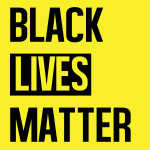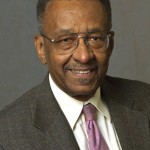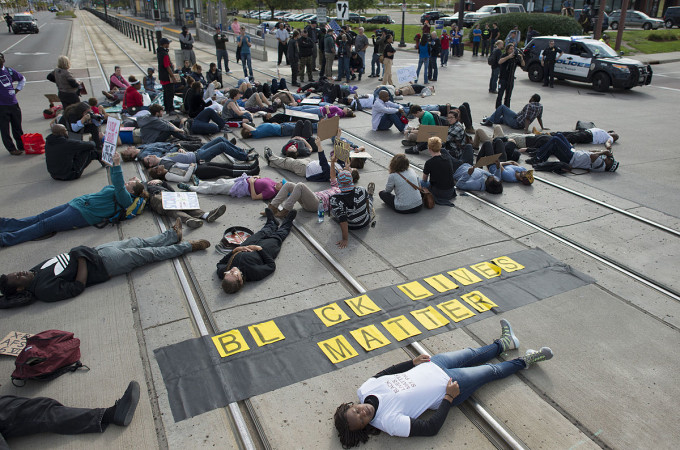Photo by Fibonacci Blue from Minnesota
“Black lives matter, but some black lives matter more than others” (with apologies to George Orwell).
At least that’s what one gathers from the movement. It began only after several controversial (and lamentable) police shootings.
In the words of one of the founders, Alicia Garza: “#BlackLivesMatter was created in 2012 after Trayvon Martin’s murderer, George Zimmerman, was acquitted for his crime, and dead 17-year old Trayvon was post-humously placed on trial for his own murder. Garza and two friends, Patrisse Cullors and Opal Tometi, began tweeting BlackLivesMatter. The hash tag and a movement was born.”
In rapid succession three incidents involving police officers and the tragic deaths of three young black men fueled the movement.
- August 9, 2014, Ferguson, Missouri: Michael Brown, an unarmed black teenager, was killed by a white police officer. The incident sparked racial tensions and riots in Ferguson and its surrounding area, making international news and creating a new, mythical slogan “Hands Up, Don’t Shoot!”
- October 20, 2014, Chicago: A knife-wielding 17-year-old black Chicago youth was shot 16 times by a white police officer. Video footage of the shooting was covered up by the Chicago PD for over a year.
- April 19, 2015, Baltimore: A black man named Freddie Gray died after a trauma injury suffered while in the custody of the Baltimore police. Days of riots followed.
These and other similar events have fueled the intervention of BLM.
 According to their website, “Black Lives Matter is an ideological and political intervention in a world where Black lives are systematically and intentionally targeted for demise.” It is “a call to action and a response to the virulent anti-black racism that permeates our society.”
According to their website, “Black Lives Matter is an ideological and political intervention in a world where Black lives are systematically and intentionally targeted for demise.” It is “a call to action and a response to the virulent anti-black racism that permeates our society.”
In short, the BLM “ideology” sees the American criminal justice system as inherently racist. Thus black youth are targeted and killed by racists cops. Yes, all black lives matter, including those youth who are killed by policemen. And there are undoubtedly some rogue, racist cops. But an ideology that sees the system as inherently racist will paint all cops as racists.
BLM rejects the generic “all lives matter.” Some of its adherents no doubt believe all lives matter, but they are eager to maintain the focus on their issue. Yes, the Declaration of Independence enshrined the ideal that “all men are created equal.” Yes, in the ensuing 240 years, much progress has been made—African slaves were emancipated, Martin Luther King Jr. changed a national conversation, the civil rights movement won out over Jim Crow. Yet, say the BLM, black lives remain under assault in the USA. White racism still dominates the nation’s landscape. So to say that “all lives matter” is to rob BLM of their target.
All Black Lives Matter
The lives of blacks who have been “targeted” by cops matter. But don’t all black lives matter?
According to their own statement, Black Lives Matter is an “ideology.” It is not based on empirical evidence that all whites are racists, or the nation’s police departments are full of racists who target black youth. It seeks to be a “political intervention,” pursuing political power. It is intended as a rallying cry to overthrow the current racial status quo in the USA.
BLM does not pursue moral or spiritual intervention. It is not a call for symmetrical responsibility between police and black youth. That’s regrettable. Teaching personal responsibility would do much to heal the brokenness in our communities and reduce the conflict between police and black youth. Taking responsibility for one’s actions is the key to improving one’s life and changing one’s circumstances.
It is a fallacy that the nation’s police departments are uniformly and intentionally targeting blacks for death. Heather MacDonald, writing in the February 11, 2016 Wall Street Journal, addresses this.
For starters, fatal police shootings make up a much larger proportion of white and Hispanic homicide deaths than black homicide deaths. According to the [Washington] Post database, in 2015 officers killed 662 whites and Hispanics, and 258 blacks. (The overwhelming majority of all those police-shooting victims were attacking the officer, often with a gun.) Using the 2014 homicide numbers as an approximation of 2015’s, those 662 white and Hispanic victims of police shootings would make up 12% of all white and Hispanic homicide deaths. That is three times the proportion of black deaths that result from police shootings.
There may be some rogue cops that have targeted black youths. But the empirical data denies that police, in general, are doing so. And there is evidence of something more chilling: blacks are killing blacks at much higher rates!
Is it only black lives ended by policemen that matter? Is it only blacks whose lives are taken by whites that matter? Obviously, all black lives matter!
Black lives matter … even those taken by other blacks
Heather McDonald points out the black-on-black homicides and black-on-police murders:
There were 6,095 black homicide deaths in 2014–the most recent year for which such data are available–compared with 5,397 homicide deaths for whites and Hispanics combined. Almost all of those black homicide victims had black killers.
Police officers–of all races–are also disproportionately endangered by black assailants. Over the past decade, according to FBI data, 40% of cop killers have been black. Officers are killed by blacks at a rate 2.5 times higher than the rate at which blacks are killed by police.
In recent years up to 93% of black deaths in the United States have been blacks killing other blacks. For more statistical analysis go here.
 Professor Walter Williams of George Mason University reinforces this sad reality.
Professor Walter Williams of George Mason University reinforces this sad reality.
Each year, roughly 7,000 blacks are murdered. Ninety-four percent of the time, the murderer is another black person. Though blacks are 13 percent of the nation’s population, they account for more than 50 percent of homicide victims. Nationally, the black homicide victimization rate is six times that of whites, and in some cities, it’s 22 times that of whites.
Where is the cry from BLM that black lives ended by other blacks matter? Where is the press coverage of the staggering black-on-black violence that makes rogue police violence against blacks pale in comparison? If all black lives mattered we would hear a call for moral and spiritual renewal in the black community. Young black men would be challenged to take responsibility for their actions.
It seems that black lives taken by other blacks don’t matter!
Black-on-black violence in our cities
In 2012 Chicago became the country’s most violent city; the homicide rate topped 500. Tragically, violence is dramatically increasing in Chicago again this year, most of it black-on-black. The following table compares the last two Januarys. Note that the 2016 statistics almost double the horror of last year.
|
Jan 2015 |
Jan 2016 |
|
| Shooting Victims |
136 |
292 |
| Shooting Incidences |
119 |
242 |
| Homicides |
29 |
51 |
Cry Racism
In this age of political correctness, racism is defined specifically as white-on-black. Black-on-white violence is not considered racism. In any case, as journalist Juan Williams points out, “The number one cause of death [among] young black men 15 to 34 is murder. Who’s committing the murder? Not police. Other black men.”
Former NFL linebacker Ray Lewis recently posted a powerful appeal to his fellow black Americans:
We Must Change What We Are Doingmy heart is hurting – we must do better
Posted by Ray Lewis on Saturday, April 2, 2016
We should weep when any young person is killed, in whatever circumstances, for whatever reason. We should be angry at racial aspects to a murder. But why does society declare white-on-black violence racist, and not black-on-white? Why do black killers of white police officers get a pass from the media and celebration from BLM?
Why is the media and political chattering class up in arms over the events in Ferguson, and utterly silent at the August 11, 2015 death in Salt Lake City of a white man at the hands of a black police officer?
Why does the black community condemn a white police officer who kills a young black man in the line of duty and yawn at the senseless black-on-black violence and mayhem in their own communities?
Is this not a sign of racism? Should not justice be color-blind?
- Darrow Miller






